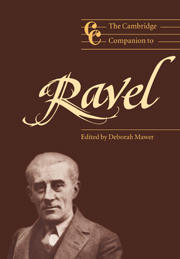Book contents
- Frontmatter
- Introduction
- Part I Culture and aesthetic
- Part II Musical explorations
- 4 Ravel and the piano
- 5 Harmony in the chamber music
- 6 Ravel and the orchestra
- 7 Ballet and the apotheosis of the dance
- 8 Vocal music and the lures of exoticism and irony
- 9 Ravel's operatic spectacles: L'Heure and L'Enfant
- Part III Performance and reception
- Appendix: Early reception of Ravel's music (1899–1939)
- Notes
- Select bibliography
- Index of names and works
8 - Vocal music and the lures of exoticism and irony
from Part II - Musical explorations
Published online by Cambridge University Press: 28 September 2011
- Frontmatter
- Introduction
- Part I Culture and aesthetic
- Part II Musical explorations
- 4 Ravel and the piano
- 5 Harmony in the chamber music
- 6 Ravel and the orchestra
- 7 Ballet and the apotheosis of the dance
- 8 Vocal music and the lures of exoticism and irony
- 9 Ravel's operatic spectacles: L'Heure and L'Enfant
- Part III Performance and reception
- Appendix: Early reception of Ravel's music (1899–1939)
- Notes
- Select bibliography
- Index of names and works
Summary
Given that Ravel's compositional output is relatively small for a major composer, his corpus of thirty-nine songs would appear to be significant by sheer size alone. However, once we discount the eight songs composed prior to the orchestral cycle Shéhérazade (1903) – all essentially student efforts, and the twelve folk melodies for which Ravel provided accompaniments as something other than fully composed, serious ‘art song’, we are left with quite a scant amount of work. How then does the genre of song figure within Ravel's oeuvre? Is its stature analogous, say, to that of solo song in Mozart, or perhaps Stravinsky – some tasty morsels obscured by works of far greater scope and quality? Or is the situation closer to Debussy, whose songs clearly are more significant and represent a critical component of his stylistic evolution?
Despite its relative obscurity, even for devotees of Ravel, the genre of song is crucial to his compositional development and achievement. Ravel himself cited among his favourite works the Trois poèmes de Stéphane Mallarmé and the Chansons madécasses. More concretely, the songs (and the operas) provide a perfect conduit for characteristic elements of Ravel's musical voice, including exoticism, irony, ‘literalism’ (text painting on multiple planes) and archaism.
- Type
- Chapter
- Information
- The Cambridge Companion to Ravel , pp. 162 - 187Publisher: Cambridge University PressPrint publication year: 2000
- 17
- Cited by



